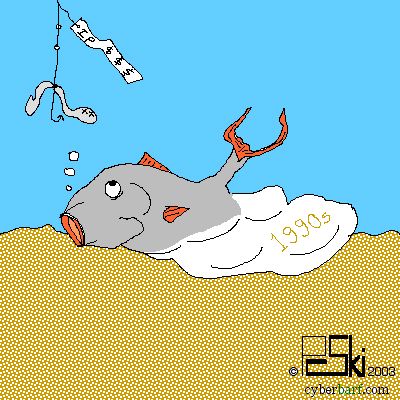cyberbarf
EXAMINE THE NET WAY OF LIFE
Convergence
Two news stories hit the wires last month. They were from different parts of the globe. But they have the substance of the Internet convergence that most people would have missed completely.
Democratic presidential candidate Howard Dean, the current liberal media darkhorse favorite, announced that his campaign has raised $1 million in donations through his Internet campaign website. Since he comes from a small New England state, and he has no national political organization or support, raising funds without spending a lot of resources is critical to his candidancy. Other national candidates, like a Kerry or a Gephardt, could raise a million at one fancy dinner party. So for Dean, raising a million dollars through a campaign web site is a big deal.
The last presidential election had the birth of candidate web sites. It was the full metal glorified glowing self promotion press releases that were posted for 24/7 public consumption. It added a line to all campaign signage. It was a practical nuisance for most candidates. No one claimed that it was a key factor in the campaign or the election result.
But we are heading more toward an electro-democracy. Web sites developing into a major technological advantage will be a key in that arena of public opinion. One million today, a hundred million tomorrow. But for Dean, his chances remain a million-to-one, a relatively small footnote in history. He has no chance to win the nomination, and the web can only boost his profile for a short while until the mainstream media turn on his candidancy and rip apart his issue positions. A small, underfunded candidate cannot withstand the megamedia onslaught on his candidancy. He is putting is life on full view to be butterflied by enemies, pundits who will ridicule and loath him and his positions. Exposing oneself to clear defeat to that is political suicide.
The other story came from Japan. Now, the Japanese culture is pretty intense by American standards. World War II combat pilots on kamikaze missions in order to succeed in their mission. At home, if one brought scandal to the family name, suicide was an acceptable solution. But as Japan westernized its morals, this behavior became more remote. Now, with the end of the cradle to grave promise of Japanese business enterprises to provide an entire career for each member of their workforce, each family member needs to be productive, change jobs, and provide for the family in the high rent high price urban island.
So if families can no longer support suicide as a solution to a personal setback, where does a despondent person turn? Apparently, to the web. Japanese suicide rates have skyrocketed as a result of like minded individuals making mass suicide pacts on the Internet. It is like a support group in full metal reverse. Instead of calling social workers on suicide prevention hotlines, they are in chat rooms with other suicidal people plotting a Jimmy Jones, that's some strange tasting cool-aide, end to their collective lives. This use of the net has chilling connotations.
This is one dark corner of the Internet culture. There are as many dark corners as bright spots on the worldwide web. In all the hype about the good things about web distribution, web publication, or the promise of cultural change, the rotation of the spin also collects its share of losers in its web. The web is a powerful tool for self promotion and self loathing. The thoughts and wide expanse of net publication is limitless. Is the medium now the messenger? Is it more than a final cry for attention that will drive people to ulitize this medium? Suicide, whether political or real, is one harsh end of the program.
A new Real News Komix!
DOGLEG begins weekly on
Friday, June 6, 2003
at
pindermedia.com
Mumbling Renaissance Man
No record exists of when man fire invented the use of fire. He probably got struck by lightning, burned by forest fires. Did he walk to the edge of a burning brush, poked a stick at the red embers, and learned he could transport the flame to the cold, wet cave? Then how did he reach the next step of creating fire by himself? Was it an accident that he was striking flint and stone to create a spear tip when a spark set his loin cloth on fire? Did he say ouch or some other curse? Then how did he communicate his discoveries to his clan? Was he put in charge because of his discoveries or shunned as some madman?
There are fading images of eccentric men tinkering in their barns by whale oil lamps harnessing the forces of nature to create steam engines and the power of rotary motion. They labored over pieces of metal and wood, grappling with the unnamed physics in the pre-Victorian age. They were motivated by inspiration, vision, the curious nature. Those obsessed with their life's work were called crazy or mad scientists. But in retrospect, they all were renaissance men. They had the time and resources to create beyond the current conventions. They were not satisfied with the knowledge learned from text of their academic professors. They learned to master all the sciences, to learn of the overlapping principles, and forging the concept of applied science to practical applications. Many were self-taught theorists. But they had something off-center in their brain to make revolutionary discoveries.
Where will the next revolutionary discoveries come from? From a programmer who is debugging a million lines of operating code? Or from someone trying to see through an electron microscope how enzymes and protein chains interact in variable medium solutions?
America is more obsessed with fame than knowledge. The reality television shows buttress the point. It is easier to make a jackpot salary by being an american idiot than finding a cure for the common cold. If you can run a 4.2 40 yard dash, or belt out a song like the next Barry White, you are the center of attention. This is not a good distraction when our base industrial production is now in Asia and China, and the American corporations who invested their entire future on Chinese labor and markets are finding themselves now squeezed out by local manufacturers of their technology. A hundred million rural Chinese farmers could care less who can run a 4.2 40 or sing like Barry White. They care only about having a job, having enough food to survive, and maybe one male heir to continue their legacy curve from abject poverty to sweatshop poverty.
The only way to survive in a shrinking service economy is to have multiple skills. Can you format your own word processing? Can you prepare a simple spreadsheet without spending an entire day going back and forth between the screen and the manual? Can you change an inkjet cartridge without spraying the walls in a black swath? Can you do minor repairs on the office copier in order to meet a deadline? Can you reformat files in order to make email attachments open properly at their intended destination? When a computer crashes, are you able to reboot it without using a sledgehammer? Can you do your job, and maybe one or two collateral jobs, at the same time?
What if the Internet Boom was a fad, like a really bad 1970s Disco-rhinestone fashion scene?
What if the only lasting legacy of the cross over to Internet usage by the average person is email?
At this point, post-tax season, in a rare bow to the taxman, it has been reported that a record number of taxpayers filed electronically. There is no excuse at this point in technology time that government agencies should have every form and instruction on-line. The IRS website is an example that it is information resources are the prime functions of government service.
Innovation over Matter
There were the free music swapping software services. Then there were the record company/chain subscription music download sites. Pirate sites were shut down. The media owned sites made glacially slow sales gains. The whole concept of on-line music distribution seemed to be mired in post-hot IPO wanderlust quicksand of eCommerce. Critics said it never made sense because people would NEVER pay money for something that they could get for free.
Well, that same argument was made of cable television. Who would pay for television programming that you get for free from the three networks? When cable came from the rural hinterland and into mainstream urban franchises, no one thought the stranglehold of the major networks would erode. However, the free networks continue to lose ratings to the fragmentation of cable and sat-TV viewership. In the convoluted ownership partnerships of new media corporate channel homesteading, the major free networks still have their fingers in the overall pie, and are using their prime cable channels as rerun fodder programming to cut costs.
Well, an argument was also made against the movie rental business. Who would go to the movies when they could rent it for a buck and play it at home? The box office hundred million dollar blockbuster still outshines the margins of the local blockbuster video store in comparable sales. But video chains are getting hit by cable, also. The pay-per-view dial in is cutting into the video rental business because a person does not have to leave their home to get what they want.
Convenience. It is no longer slang for the corner Rip N Run store. In the time strapped, service economy, convenience is an increasing important factor for consumers. It is as important as customer service, which is almost nonexistent in the telecommunications industry. It is one thing to try to sell crap, but it takes a special breed to sell it as designer crap at a huge mark-up. There is a segment of consumer who only equates quality with price; the higher the price tag the better the perception of quality. There is another segment of the consumer universe who is not fooled by a $50 label on a $10 shirt. They will pay a little extra to know that what they want is in stock, and they don't have to wrestle a sales clerk into a death match over whether there are any other samples in the stockroom. Convenience sells.
Now, the Internet has been sold as the perfect, seamless distribution channel. But one needs to have a product that does not need tactile sales.
So Apple Computer unveils its iTunes music service. It is a big opening day hit; it made some people woozy like stock analysts foam at the mouth at the first week's million downloads projection of an additional $200 million in revenue for the company.. The stock price zooms like the latest Top 40 pop diva's record.
The Apple site takes critics by surprise. It is easy to use. It is well laid out. It has exclusive features. Why is this so different than the prior music sites?
Think different. Steve Jobs has a knack of making things look different and of making people think differently about what he is selling. He is not selling Mac computers, but a rebellious lifestyle against the Microsoft monopoly. The ease of use of a Mac operating system looks childlike compared to the crashy, copycatWindows world. Jobs is selling iPods, your portable music library. Who needs 7,200 songs on a machine that fits into your coat pocket? That is more music than a college or pirate radio station! He is not selling just a music PDA, but your own private radio station playlist maker that automatically synchs with your computer. (It has to fill a growing need fueled by the sorry and sad state of commercial radio stations.)
The idea is not new. Selling music over the net. Amazon has been trying to sell everything entertainment for years. Downloading music into a portable player. Others have tried, and few have survived. But Jobs has the magic to make it hip, accessible, cool, and lest we forget, profitable. Profits and Internet music distribution were never supposed to occur in the same sentence.
It appears it does not matter what is being sold -- its innovation over matter. Make it easy to use, make the platform stable, make it cool, and make it affordable, and people will come and buy. 99 cents a tune. Less than a sawbuck for an album. The record companies were not convinced that it would work. They joined the critics in their surprise that the iTunes start. Which puts them in a Catch-22 situation: record companies were the distribution arms for artists under contract; now artists can record and distribute directly via the web to their fans through sites like Apple.
The writing may be on the wall. Two national music stores are for sale, and there has been no interest. Small independent record stores have had to adapt in order to survive; like selling DVDs along side CDs, or oldies over current releases. But a server can house everything digital. One stop shopping for your digital entertainment needs. Maybe that's the real definition of Job's digital lifestyle mantra that he has been preaching the last few years.
But it may not last. Listen.com has announced that it will distribute songs at 79 cents per download. Competition against Apple's 99 cents price-point. An old fashion gasoline station price war could lead to the ultimate irony between competitors. Free downloads. Innovation full circle.
But that may not matter, either. Apple has always been a Jekyll & Hyde operation: is it a hardware company or a software company? It has been both. Is the iTunes music store really only developed as a means of widely distributing iTunes software, or to fuel the sale of new iPods?
Then the next digital entertainment link at the Apple store: DVD downloads? Into a new iDVD player?
Disclosure: Author is a semi-disgruntled shareholder.
iToon
presents
The Real News
Real News Komix
Streetlife for
Your Mind
Distribution ©2001-2003 pindermedia.com, inc.
All Rights Reserved Worldwide.
Contact Information
Terms and Conditions
Trademarks
Archives
T-shirts, Caps, Mugs. Check for Specials!







